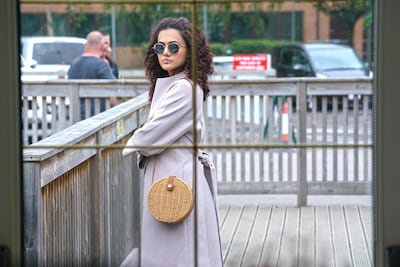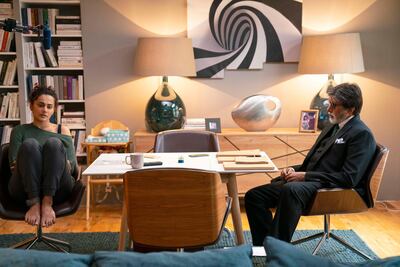Badla is a mystery thriller that is being sold as a tense watch, but in all honesty, the suspense is tepid. This is a one-time watch rather than an instant classic.
Badla means revenge, and this remake of Spanish film Contratiempo or The Invisible Thief is by Sujoy Ghosh, the filmmaker who brought us the two-part and excellent Kahaani series.
The film revolves around two characters – businesswoman Naina Sethi (played by Taapsee Pannu) and lawyer Badal Gupta (Amitabh Bachchan). For the majority of the movie they are in a small apartment in London pouring over incidents from Sethi’s past. Why? Because she has been accused of murder.
Sethi is a career woman who has a husband and child but gets into an extra-marital affair with Arjun Kapoor (Tony Luke, who is just average in the role). She is the businesswoman of the year, and so clearly a shrewd mind, but in the film we find Sethi in a hotel room, which is locked from the inside, looking over the dead body of Kapoor, and she herself is injured.
She claims she is being framed after she is accused of his murder, but the world, and the viewer, see a different version altogether. Sethi enlists the help of lawyer Jimmy Punjabi (Manav Kaul) who then sends over Bachchan's deep-voiced Gupta to work on her case.
When the story is not told via scenes with Bachchan and Pannu, it turns to flashbacks, mostly set in Scotland. Visuals aside, dialogue is so paramount to a mystery film, and in this film they are are precise and loaded, and the main driving force for the story.
Veteran star Bachchan is perfect in the role of a lawyer - the expressive face, the twinkle in the eye, the authority so clear in a baritone voice such as his. But when the climax unfolds, and you realise what's happened, the lawyer part looks to have been overacted by him somewhat. Fast fact: Bachchan even lends his voice to a rap-style track to go along with the opening credits.
Pannu, on the other hand, underplays both her roles: the clever businesswoman and the victim of circumstances that her character claims to be. This was a role with layers, which Pannu as an actress could have definitely pulled off, but which the director has failed to extract.
So what unfolds?
Without giving too much away about the plot, Gupta and Sethi go over the evidence together, and take the story forward with theories and counter-theories, Sethi working to ensure a water-tight defence in court.
As Gupta says in the movie, "the details" are important, and the pair act as storytellers that drop clues for us. The film is full of hidden details, too: Bachchan's character's first name in the film, Badal, is an anagram of Badla; revenge.
Ultimately, the ride is more interesting than the climax here. There is an interesting reference in the film to the game of Chausar – a variant of Ludo – played in ancient India, and how the game is a journey, but one in which the answer to something usually lies exactly where you started.
But, when you realise that, after all the suspense, the conclusion is close to where you began, it can leave you with a sense of deprivation as a viewer, and that's what happens here. That's why Badla is a nice one-time ride, but do keep your expectations in check before you buckle up.




